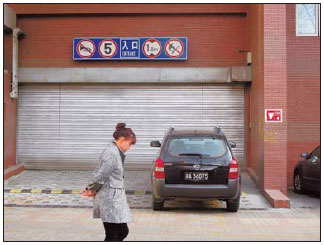Residents mad after being driven from parking garage
A dispute continued on Wednesday between residents and a developer over the closure of a parking building.
 |
|
A resident passes the entrance of the closed parking building in Wangjing. |
The residents from the Wangjing West Community began unfurling protest banners on Monday in the community's park and playground to protest the closure of their parking garage. They were soon stopped by police and urban management officers.
But the angry residents refused to give up and moved their banners inside their apartments where they displayed them through windows, out of the officers' jurisdiction.
The 200 residents were complaining about the closure of their 10-floor parking building and saying it means they are being forced to either park in the fire lane or in the streets.
Zhang Ping, a resident who lives in building 314-B, said he expects more after paying 1,800 yuan in parking fees to the property management company.
The dispute flared several months ago after a company named Oudian posted a notice in the parking building saying that residents had to move their vehicles out because it had purchased the management and operational rights to the building.
Most car owners refused to go but that all changed in July when eight cars in the building were damaged.
With the building empty, Oudian then shut it down.
Residents started their protest on Monday after the property management company started to collect parking fees for 2011.
"Hanging banners is the mildest way we can think of," Zhang said. "If they don't give back our parking lot, we will take further action such as filing a lawsuit."
But Cao Mingde, the manager of Oudian, told China Daily the building will continue to be used for parking. He said it was simply closed because the company wants to renovate it - something that will take about two more months.
"I will reopen the parking lot after the renovations and the parking fee will remain the same, which is 150 yuan per month," he said.
However, lawyer Cui Jianan said property law says it is illegal to carry out such renovations without the consent of two-thirds of residents.
 0
0 






